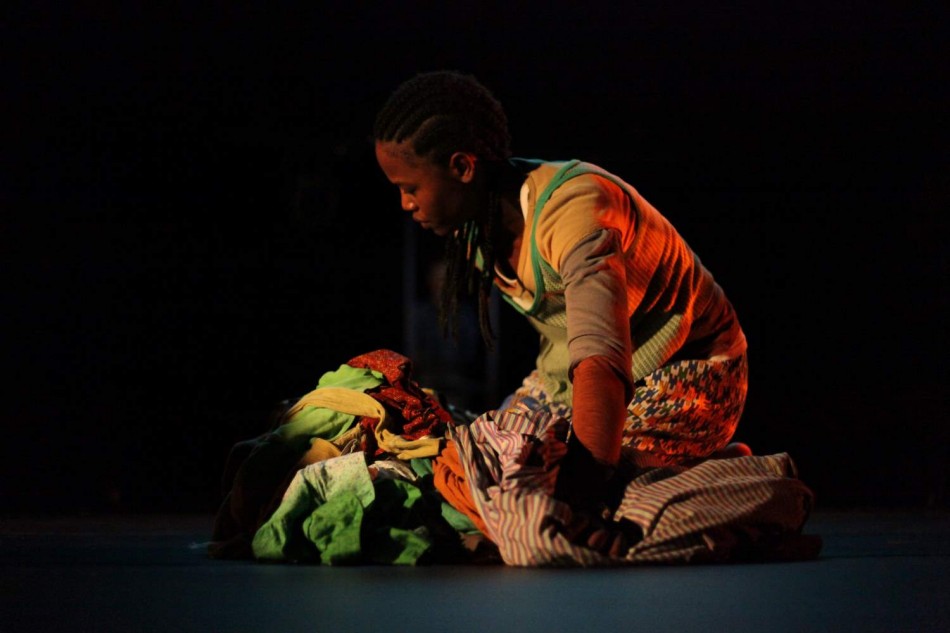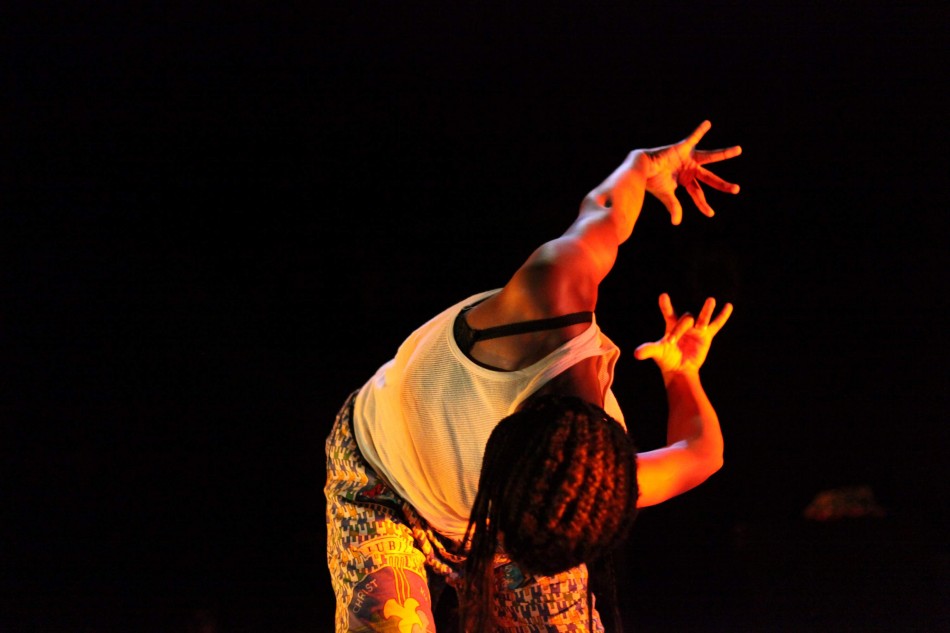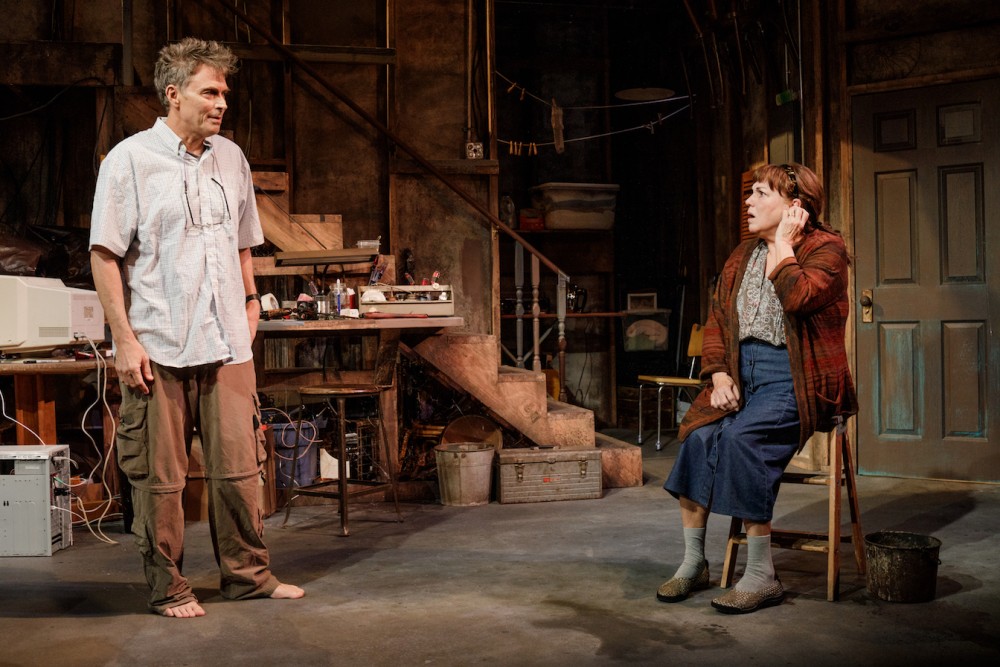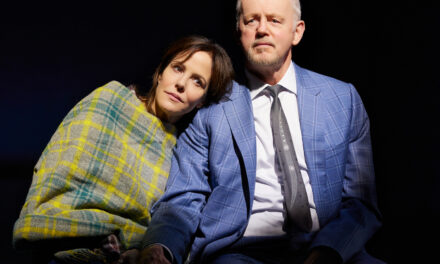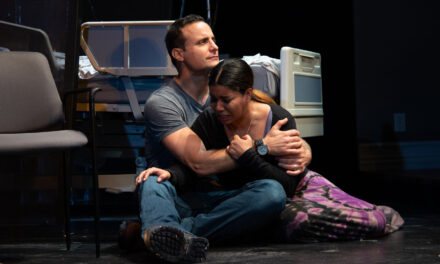A Powerful and Electrifying View of 100 Days of Blood
by Carole Di Tosti
As the lights dim we hear the shrill scraping sounds of knives sharpening to their own slow, disembodied rhythm. Accompanying their irrevocable grating, is a lyrical, full bodied female voice who intones a wistful African melody with mystery and power. In the darkness to the far left, there stands a shrouded figure nearly invisible, standing at the ready, waiting. These three foreshadowing elements and the players who represent them (musician Alain Mahé, singer, actor, dancer, choreographer Dorothée Munyaneza and Ivorian dancer Nadia Beugré), provide the vibrant, spinning threads used to convey the dynamic ethos of Samedi Détente, an amazing conceptualization of the Rwandan Genocide which is part of the Public Theater’s Under the Radar Festival 2016.
How does one retell the story of one’s neighbors hacked with machetes or shot, burned alive, eviscerated or slowly butchered limb by limb in an incomprehensible rage fueled explosion of savagery that lasted for 100 days and annihilated 800,000 people? There are no adequate words to explain what Dorothée Munyaneza saw of the desecration of human life when she was 12-years-old and her father, a peace-loving minister, had to protect his family from Hutu militia who suspected he might be harboring Tutsi “cockroaches.”
However, twenty years after the events of 1994, Munyaneza who conceived, directed and choreographed this production, manages to encapsulate that helter skelter time of brutality and chaos. She uses an intriguing and innovative approach effecting a Rwandan radio program, “Samedi Détente,” that she listened to as a child before the genocide. Indeed, its choice represents a yearning to get back to a time when active violence didn’t pulse through the veins of compatriots-Tutsis and Hutus, and Saturday was a day to relax and celebrate life through dance and song. Munyaneza’s embrace of a program before the bloodletting indicates her desire to expiate, forgive and hope for the future, with this chronicle of events that enlighten and instruct, so that such human atrocity may not happen again.
Munyaneza’s choice of a program achieves her purpose. Only through a combination of mediums can we receive a greater understanding of the unimaginable. With the wonderful assistance of Beugré and Mahé, sometimes in solo, mostly in tandem, we gradually envision the cataclysm which erupted after the plane of Rwandan President Juvenal Habyarimana was shot down. Munyaneza sings, then continues her eye-witness narration of the Hutu militia’s initial visit to her home while her mother was away in London.
With every segment of her personal narration that lifts the dynamic events toward their final crushing pinnacle, there is the accompanying dance and music. Each is prompted by an emotion, mood, feeling, whether of panic, fear or horror or the poignant wish to return to a peaceful time.
The events move into turning points as the bodies pile up. Information read by Mahé in French signifying the West’s reaction to the genocide, is dropped in the presentation like grenades amidst Munyaneza’s narrative segments, admidst the dance and staging with unique costume changes and prop movements. We learn about the UN peace keeping force withdrawals and we learn that the West has abandoned the Hutus and Tutsis to each other with no intervening mercy.
As she relates her remembrances of that fearful time, the visceral and symbolic motifs are conveyed by Nadia Beugré‘s emotionally powerful movements and dance as well as her own song and movement. Indeed, all the brief narrative segments have their counterparts in music and dance. The effect is cathartic. The expressive and thrilling song and movement are expiating. All are intensely original.
Munyaneza narrates that she journeys with a small child, David, and imagines she is his mother to take her mind off her own coming death. Death is always around the next corner with warning cries that state, “the Hutu militia are coming.” In this intense drama of life and death, we empathize; something must be done to stop the chaos. Yet, we know that nothing or very little will be done because there is no Western will to intervene. The lightning strikes hard when Mahé reads a statement by Francois Mitterand regarding Rwanda, “In such countries, genocide is not too important.” The deaths and massacres numbered 392,000 by that point and they continued.
Samedi Détente is riveting. Brilliantly conceived and executed, it stands as a monument to all who were killed and a testament of the regenerating power of the human spirit to express, expiate and hope for tomorrow. It runs at the Public Theater until Sunday, January 17th.


